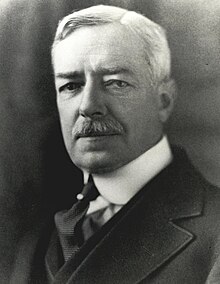
Back روبرت لانسينغ Arabic روبرت لانسينج ARZ رابرت لانسینق AZB Роберт Лансінг Byelorussian Robert Lansing Czech Robert Lansing Danish Robert Lansing (Politiker) German Robert Lansing Esperanto Robert Lansing (político) Spanish رابرت لانسینگ Persian
Robert Lansing | |
|---|---|
 | |
| 42nd United States Secretary of State | |
| In office June 24, 1915 – February 13, 1920 Acting: June 9 – 24, 1915 | |
| President | Woodrow Wilson |
| Preceded by | William Jennings Bryan |
| Succeeded by | Bainbridge Colby |
| 3rd Counselor of the United States Department of State | |
| In office April 1, 1914 – June 23, 1915 | |
| President | Woodrow Wilson |
| Preceded by | John Bassett Moore |
| Succeeded by | Frank Polk |
| Personal details | |
| Born | October 17, 1864 Watertown, New York, U.S. |
| Died | October 30, 1928 (aged 64) New York City, U.S. |
| Political party | Democratic |
| Spouse | Eleanor Foster (1890–1928) |
| Education | Amherst College (BA) |
Robert Lansing (/ˈlænsɪŋ/; October 17, 1864 – October 30, 1928) was an American lawyer and diplomat who served as the 42nd United States Secretary of State under President Woodrow Wilson from 1915 to 1920. As Counselor to the State Department and then as Secretary of State, he was a leading advocate for American involvement in World War I.
Lansing was born and raised in Watertown, New York, where he joined his father's law firm after graduating from Amherst College. After developing expertise in international law and marrying the daughter of Secretary of State John W. Foster, he served as associate counsel to the United States delegations to the Bering Sea Arbitration and Bering Sea Claims, before arguing the United States case before the Alaska Boundary Tribunal in 1903.
As a conservative, pro-business voice in the Democratic Party, Lansing was appointed by Woodrow Wilson as Counselor to the State Department under Secretary of State William Jennings Bryan. When Bryan resigned on June 8, 1915 over Wilson's policy toward Germany, Lansing was elevated to succeed him.
As Secretary of State, Lansing was a strong advocate for the United States' role in establishing international law and an avowed critic of German autocracy and Russian Bolshevism.[1] Before U.S. involvement in the war, Lansing vigorously advocated freedom of the seas and the rights of neutral nations. He later advocated U.S. participation in World War I, negotiated the Lansing–Ishii Agreement with Japan in 1917 and was a member of the American Commission to Negotiate Peace at Paris in 1919. However, Wilson made Colonel House his chief foreign policy advisor because Lansing privately opposed much of the Treaty of Versailles and was skeptical of the Wilsonian principle of self-determination.
- ^ David Glaser (2015). Robert Lansing: A Study in Statecraft. Xlibris Corporation. pp. 1–3. ISBN 9781503545014.